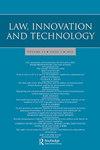Can AI infringe moral rights of authors and should we do anything about it? An Australian perspective
Q1 Social Sciences
引用次数: 0
Abstract
ABSTRACT While artificial intelligence technologies (AI), such as machine learning (ML), hold significant potential for the economy and social wellbeing, it is unclear to what extent copyright laws stimulate or impede the development of these promising technologies. The unauthorised use of copyright-protected works in the ML process and its possible implications on economic rights of authors have been previously explored, however, the implications of such use on the moral rights of authors – the rights of attribution and integrity – have not been examined. This paper, by focusing on Australia as a case study, explores whether the use of works as training data in the ML process could amount to the infringement of moral rights of authors and, if so, whether law reform in the area is needed.人工智能是否会侵犯作者的道德权利,我们是否应该对此采取措施?澳大利亚人的视角
虽然人工智能技术(AI),如机器学习(ML),对经济和社会福祉具有巨大的潜力,但版权法在多大程度上刺激或阻碍了这些有前途的技术的发展尚不清楚。在ML过程中未经授权使用受版权保护的作品及其对作者经济权利的可能影响之前已经进行了探讨,然而,这种使用对作者的精神权利的影响-归属和完整性的权利-尚未得到审查。本文以澳大利亚为例,探讨在机器学习过程中使用作品作为训练数据是否会构成对作者精神权利的侵犯,如果是的话,是否需要对该领域进行法律改革。
本文章由计算机程序翻译,如有差异,请以英文原文为准。
求助全文
约1分钟内获得全文
求助全文
来源期刊

Law, Innovation and Technology
Social Sciences-Law
CiteScore
4.50
自引率
0.00%
发文量
18
期刊介绍:
Stem cell research, cloning, GMOs ... How do regulations affect such emerging technologies? What impact do new technologies have on law? And can we rely on technology itself as a regulatory tool? The meeting of law and technology is rapidly becoming an increasingly significant (and controversial) topic. Law, Innovation and Technology is, however, the only journal to engage fully with it, setting an innovative and distinctive agenda for lawyers, ethicists and policy makers. Spanning ICTs, biotechnologies, nanotechnologies, neurotechnologies, robotics and AI, it offers a unique forum for the highest level of reflection on this essential area.
 求助内容:
求助内容: 应助结果提醒方式:
应助结果提醒方式:


